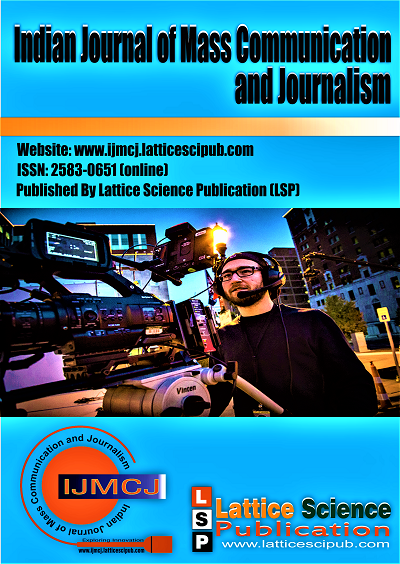Echo Chambers and Polarization: The Role of Social Networks in Shaping Beliefs in India
Main Article Content
Abstract
The rise of social networks has significantly influenced public discourse, contributing to the formation of echo chambers that reinforce ideological divisions. This study examines the role of social networks in shaping political and social beliefs in India. Employing a mixed-methods approach, this research integrates quantitative surveys with qualitative discourse analysis to assess the extent of polarization. Agendasetting theory and social identity theory provide the theoretical foundation for understanding how online communities amplify biases. The findings highlight how algorithmic curation, selective exposure, and group identity reinforce beliefs. The study proposes policy interventions to mitigate Polarization while fostering inclusive dialogue.
Downloads
Article Details

This work is licensed under a Creative Commons Attribution-NonCommercial-NoDerivatives 4.0 International License.
How to Cite
References
McCombs, Maxwell, and Donald Shaw. The agenda-setting Function of Mass Media. Public Opinion Quarterly, vol. 36, no. 2, 1972, pp. 176-187. https://www.jstor.org/stable/2747787
Tajfel, Henri, and John C. Turner. An Integrative Theory of Intergroup Conflict. The Social Psychology of Intergroup Relations, Brooks/Cole, 1979, pp. 33-47. https://www.scirp.org/reference/ReferencesPapers?ReferenceID=757561
Sunstein, Cass R. #Republic: Divided Democracy in the Age of Social Media. Princeton University Press, 2017. https://press.princeton.edu/books/hardcover/9780691175515/republic?srsltid=AfmBOoptvaxuyps8YeLOUnqTx26aXWpagHdi2eqJoFkydUdUt5o79-yo
Pariser, Eli. The Filter Bubble: What the Internet Is Hiding from You. Penguin, 2011. https://escholarship.org/content/qt8w7105jp/qt8w7105jp.pdf?t=mhzvpm
Cinelli, Matteo, et al. Echo Chambers on social media: A Comparative Analysis. Nature Communications, vol. 12, no. 1, 2021, pp. 1-8.
https://arxiv.org/pdf/2004.09603
Bozdag, E. (2013). Bias in Algorithmic Filtering and Personalization. Ethics and Information Technology, 15(3), 209-227. Bozdag, E. Bias in algorithmic filtering and personalization. Ethics Inf Technol 15, 209–227 (2013). DOI: https://doi.org/10.1007/s10676-013-9321-6
Tufekci, Z. (2018). Twitter and Tear Gas: The Power and Fragility of Networked Protest. Yale University Press. Tufekci, Z. A Response to Johanne Kübler’s A Review of Zeynep Tufekci – Twitter and Tear Gas: The Power and Fragility of Networked Protest (2017, New Haven: Yale University Press). Int J Polit Cult Soc 32, 365–369 (2019). DOI: https://doi.org/10.1007/s10767-019-9317-2
Bakshy, E., Messing, S., & Adamic, L. A. (2015). Exposure to Ideologically Diverse News and Opinion on Facebook. Science, 348 (6239), 1130-1132. https://www.science.org/doi/10.1126/science.aaa1160
Dubois, E., & Blank, G. (2018). The Echo Chamber Is Overstated: The Moderating Effect of Political Interest and Diverse Media. Information, Communication & Society, 21(5), 729-745. DOI: https://doi.org/10.1080/1369118X.2018.1428656
Gaertner, S. L., & Dovidio, J. F. (2014). Reducing Intergroup Bias: The Common Ingroup Identity Model. Psychology Press.
DOI: https://doi.org/10.4324/9781315804576
Bail, C. A., Argyle, L. P., Brown, T. W., et al. (2018). Exposure to Opposing Views on Social Media Can Increase Political Polarization. PNAS, 115(37), 9216-9221. DOI: https://doi.org/10.1073/pnas.1804840115
Iyengar, S., Lelkes, Y., Levendusky, M., Malhotra, N., & Westwood, S. J. (2019). The Origins and Consequences of Affective Polarization in the United States. Annual Review of Political Science, 22, 129-146. DOI: https://doi.org/10.1146/annurev-polisci-051117-073034
Vosoughi, S., Roy, D., & Aral, S. (2018). The Spread of True and False News Online. Science, 359(6380), 1146-1151.
https://www.science.org/doi/10.1126/science.aap9559
Guess, A., Nyhan, B., & Reifler, J. (2020). Exposure to Untrustworthy Websites in the 2016 US Election. Nature Human Behaviour, 4(5), 472-480. DOI: https://doi.org/10.1038/s41562-020-0833-x
Narayanan, V., et al. (2019). ‘WhatsApp and India’s 2019 Elections: Political Manipulation and Digital Disinformation.’ Oxford Internet Institute Report. https://demtech.oii.ox.ac.uk/wp-content/uploads/sites/12/2019/05/India-memo.pdf
Bennett, W. L., & Segerberg, A. (2013). The Logic of Connective Action: Digital Media and the Personalization of Contentious Politics. Cambridge University Press. DOI: https://doi.org/10.1017/CBO9781139198752
Sunstein, C. R. (2017). #Republic: Divided Democracy in the Age of Social Media. Princeton University Press.
https://assets.press.princeton.edu/chapters/s10935.pdf
Chakravartty, P., & Roy, S. (2015). Media Pluralism Redux: Toward New Frameworks of Comparative Media Studies ‘Beyond the West.’ Political Communication, 32(1), 1-15. https://www.tandfonline.com/doi/abs/10.1080/10584609.2012.737429
Gillespie, T. (2018). Custodians of the Internet: Platforms, Content Moderation, and the Hidden Decisions That Shape Social Media. Yale University Press. https://yalebooks.yale.edu/book/9780300261431/custodians-of-the-internet/
Fishkin, J. S. (2018). Democracy When the People Are Thinking: Revitalizing Our Politics through Public Deliberation. Oxford University Press. DOI: https://doi.org/10.1093/oso/9780198820291.001.0001
Cinelli, M., Quattrociocchi, W., Galeazzi, A., et al. (2021). The Echo Chamber Effect on Social Media. Nature Communications, 12(1), 1-8. Proc Natl Acad Sci USA. 2021 Mar 2;118(9):e2023301118. PMID: 33622786; PMCID: PMC7936330.





